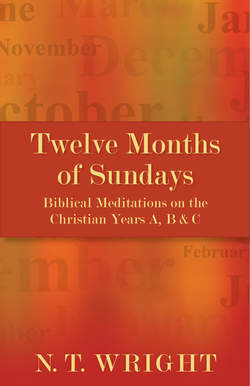Читать книгу Twelve Months of Sundays - N.T. Wright - Страница 33
На сайте Литреса книга снята с продажи.
ОглавлениеPalm Sunday
(Liturgy of the Passion)
Isaiah 50.4–9a
Philippians 2.5–11
Matthew 26.14—27.66
C. S. Lewis, writing as a literary critic, proposed a test for good writing: how often does it deserve to be read? Cheap magazine stories come at the bottom (once you know what happens, you don’t read them again), and the great novels and plays near the top (I once knew an octogenarian who read through Shakespeare every year). Thus measured, the passion narratives score highly. The action is swift, the dialogue terse and pregnant. A dozen brilliant human cameos: Jesus and Judas; Peter; Caiaphas; Pilate (and his wife); Barabbas; Simon; the bandits; the mockers; the centurion; the women; and Joseph – each one deserving careful mulling over. The whole drama swirls to and fro with friendship betrayed, new worlds evoked, justice denied, empire appeased, faith insulted, innocence abused. And still we are only in the foothills, aware of the crags looming above us, of the drama’s central character, of the questions he posed for his contemporaries and still poses for us, of his strange words and even stranger silences. Tales of torture and death are always ugly and awesome; this torture, and this death, still provoke thunder and lightning. When Matthew tells us of the earthquake, we somehow feel that nothing less would do. If these events were not pivotal to human destiny, what else could take their place? How can we not reread this tale without ceasing?
The story brings to its head the tale of the strange prophet-Messiah from Nazareth. This itself, in the evangelists’ telling, brings to its climax the entire drama of Israel – which, in Scripture, is the focal point of world history. Here we are offered that which unmakes and remakes the world, ourselves included. Here, could we but scale the crags, is the answer to our deepest questions, our most agonizing longings. And it comes, not as a theory, not as an explanation, but as a story which opens up to embrace or perhaps engulf us, sweeping us off our feet like a giant wave, carrying us off, out of our depth, away on the dark sea of God’s passion. And still the figure at the centre beckons, woos, disturbs, frightens and compels us. Like the Psalms, this story contains all that we are and feel, and lays it bare before the presence of an overmastering love.
Paul, echoing Isaiah, speaks of Jesus’ obedience (to the plan of God; to Adam’s call, and Israel’s) and vindication. Isaiah himself pictures a strange teacher, called to listen, to sustain the weary, and to undergo suffering. Elsewhere (e.g. Romans 8.31–39), Paul with considerable daring applies this same passage to Christians. Those who tell, and live by, the story of the cross may learn to hear between its lines the story of the martyrs, ancient and modern, and the call to take our own share of this world-changing, world-healing, passion. Those who go this way may have to face and suffer much. But they will not be put to shame.
